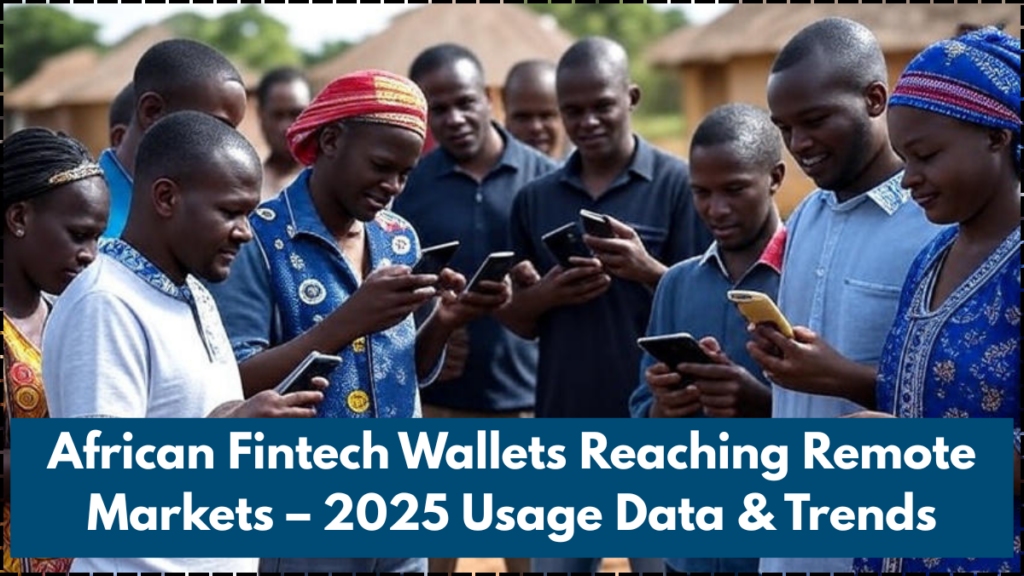The rise of African fintech 2025 marks a turning point for financial inclusion on the continent. What was once a slow shift toward digital payments in cities has now become a movement reaching remote rural communities. Digital wallets and app-based payment platforms are empowering people who have never had a bank account to save, send, and receive money. The growing trust in mobile payments Africa has made these tools part of daily life, even in villages without a single bank branch.
This transformation has been fueled by cheaper smartphones, stronger mobile networks, and innovative business models. Today, farmers, small traders, and local shopkeepers can use simple mobile wallet apps to handle transactions without needing physical cash. The year 2025 is proving that Africa’s financial future belongs to technology built for its people and their unique needs.

Why Mobile Wallets are Thriving in Remote African Regions
One of the key reasons African fintech 2025 is thriving is that mobile wallets are designed to be simple, accessible, and affordable. They work on basic phones, often don’t require internet for every transaction, and charge lower fees than traditional banks. This makes them practical for communities that previously relied only on cash.
Factors driving mobile payments Africa growth include:
-
Low transaction costs and flexible payment options
-
Widespread agent networks for cash deposits and withdrawals
-
Partnerships with governments for direct welfare payouts
-
In-app services like microloans, insurance, and savings features
These services are helping mobile wallets evolve from simple payment tools into complete financial ecosystems for underserved populations.
Usage Data and Growth Trends in 2025
In 2025, analysts report that rural adoption of African fintech 2025 services is growing faster than in cities. Many countries are now seeing mobile wallet use becoming the norm rather than the exception. The table below highlights estimated adoption in leading countries:
| Country | Estimated Wallet Users (Millions) | Rural Penetration Rate (%) | Leading Platforms |
|---|---|---|---|
| Kenya | 35 | 82 | M-Pesa, Airtel Money |
| Nigeria | 52 | 60 | Paga, OPay |
| South Africa | 30 | 55 | SnapScan, TymeBank |
| Ghana | 18 | 68 | MTN Mobile Money |
| Tanzania | 22 | 75 | Tigo Pesa, HaloPesa |
These figures show that mobile payments Africa is no longer a niche product—it has become an essential service connecting millions to the formal economy.
Challenges and Solutions for Continued Expansion
Even with success, African fintech 2025 faces barriers such as patchy network coverage, low digital literacy, and the risk of fraud. However, fintech providers are introducing creative solutions. Offline payment technology allows transactions without constant internet. Biometric authentication and strict agent verification help build trust. Educational campaigns are teaching first-time users how to safely manage digital accounts.
Government policies are also making a difference. By supporting interoperability between providers, improving telecom infrastructure, and encouraging private-sector partnerships, many African nations are laying the foundation for faster, safer growth of mobile payments Africa.
What’s Next for African Fintech in Remote Markets
The future of African fintech 2025 goes beyond basic transactions. Mobile wallets are already expanding into areas like school fee payments, crop insurance, and even remote healthcare payments. Cross-border transactions are becoming faster and more affordable, enabling migrant workers to send money home instantly.
If current trends continue, mobile wallets will become a universal tool, as common as mobile calls or text messages, and will help close the financial inclusion gap completely.
Conclusion
African fintech 2025 is more than just a technological trend—it is a financial revolution that is reshaping daily life across the continent. The rapid growth of mobile payments Africa proves that with the right tools, even the most remote communities can be active participants in the digital economy. While challenges remain, innovation and collaboration are ensuring that this progress reaches every corner of Africa.
FAQs
How is African fintech 2025 improving rural economies?
It is enabling secure payments, savings, and credit access without the need for traditional banks.
Which countries lead mobile payments Africa growth?
Kenya, Nigeria, Ghana, and Tanzania are among the top countries for adoption in rural and semi-rural areas.
What makes African fintech 2025 different from global markets?
Its focus on low-cost, mobile-first solutions that work even in areas with limited internet and banking infrastructure.
Can mobile payments Africa be used without internet?
Yes, many providers support USSD and offline payment systems that work on basic phones.
What new services will African fintech 2025 offer?
Education payments, agricultural insurance, healthcare billing, and improved cross-border remittances are expanding fast.
Click here to learn more
Sachin is a dedicated writer specializing in education, career, and recruitment topics, delivering clear and actionable insights to empower readers.
